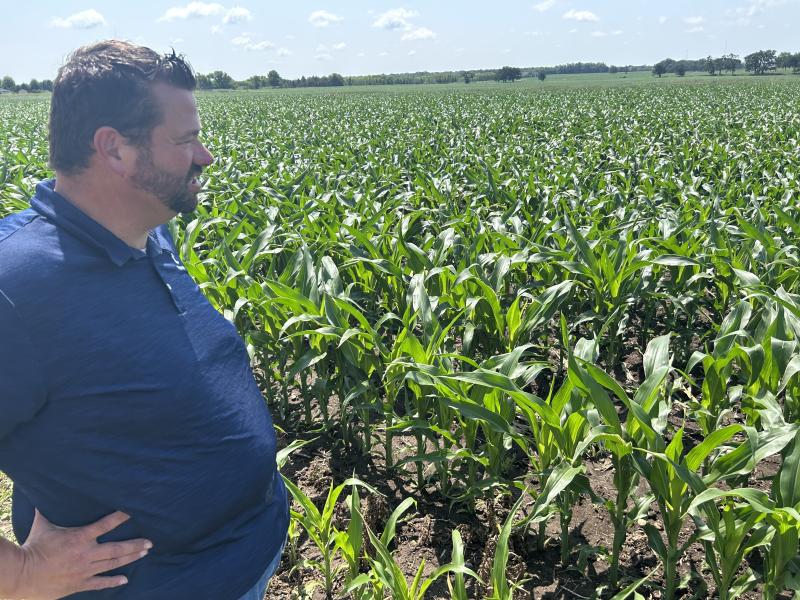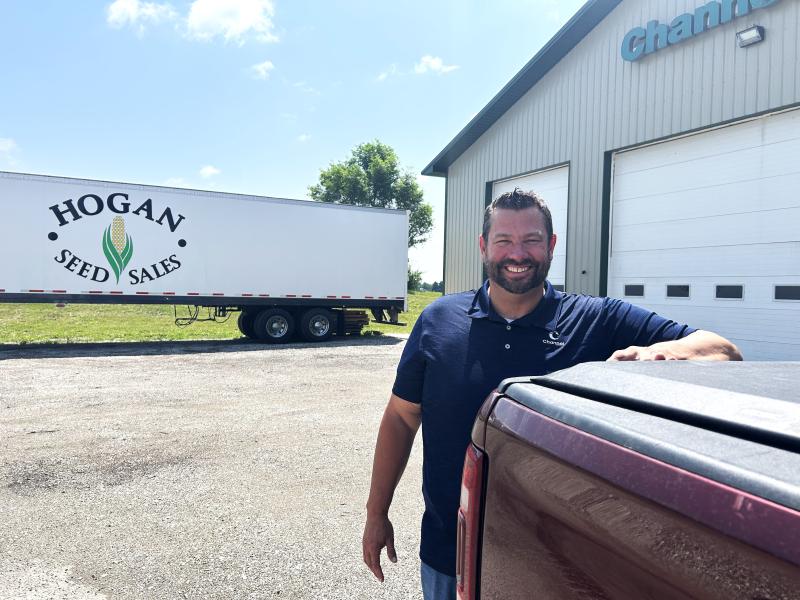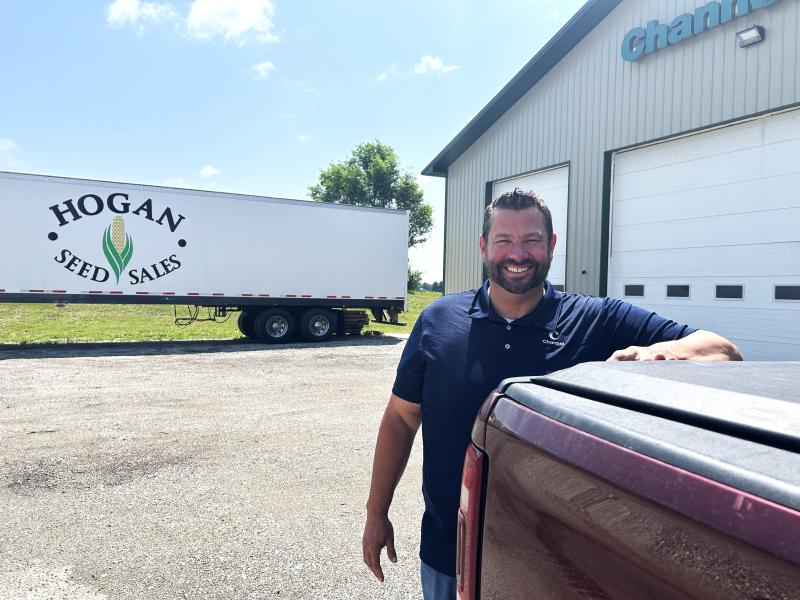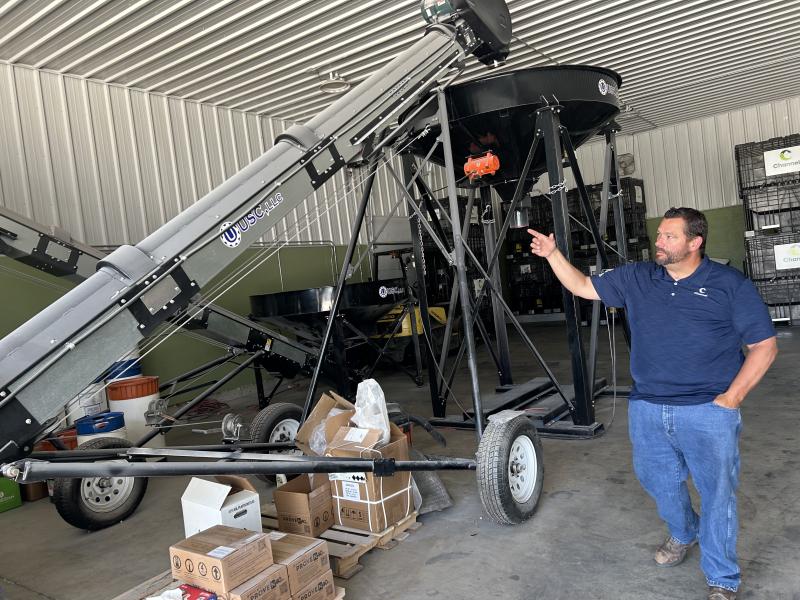By Mike Orso
Five Quick Things to Know about Jason Hogan
1. Favorite Sports Team: Chicago Bears
2. Favorite Movie: Two, “The Shawshank Redemption” and “Old School”
3. Favorite Restaurant in McHenry County: Paisano’s on Broadway, Richmond
4. What Most People Don’t Know About Me: Like to snowmobile and WWII history
5. If I Was Not A Farmer I Would Be: In industrial sales
In addition to being tested by some slumping farm commodity prices and ever-changing weather, new housing developments continue to pose challenges for many McHenry County farmers such as Jason Hogan.
“I didn’t think after 2008 it would be that much of an issue, but development is an issue for me as far as losing ground,” said Hogan, about the continued loss of farmland to subdivisions. “It has taken off since Covid. We’ve seen an uptick.”
Hogan, 52, grew up on a dairy farm in Ringwood started by his grandfather. His dad and uncle eventually purchased a farm in nearby Wonder Lake, which today, is close to being surrounded by land sprouting homes, townhouses and apartments – instead of crops.
“We’d like to keep it going with my son,” said Hogan, whose son Grant, 22, recently graduated from Iowa State University with a degree in agricultural business. “We’re not going to compete for land to grow against our customers, so our farming operation is more likely going to continue to shrink than grow. That’s why we need to be diversified.”
A graduate of Western Illinois University, Hogan’s agricultural business and marketing degree has helped him diversify the farming enterprise into the agricultural seed and seed treatment business. In addition to farming with his father, Harry, until he passed away two years ago, Jason Hogan spent about two decades working for the FS cooperative system in northern Illinois and southern Wisconsin and for the rural Woodstock-based seed company, Hughes Hybrids. Now he’s an independent seed dealer, selling corn, soybean and alfalfa seed, as well as biological and other treatments for the seed he sells, some of which partially replace the need for commercial fertilizers.
“Many of my customers will come to me with all sorts of different agronomic problems,” said Hogan. “In the eyes of a lot of people I work with I’m an unbiased person that they can bounce fertilizer and herbicide questions off of, knowing that I have the best interests in their operation.”
In addition to some of the challenges posed by development, Hogan also expresses concern for current market conditions for him and many other McHenry County farmers. A recent Farmdoc analysis released by the University of Illinois at Urbana-Champaign notes “…returns on Midwest farms are projected to be negative, resulting in continued financial deterioration” on many farms, in some cases, for a third consecutive year.
"I'm concerned with the elevated input costs and the lower commodity prices for the grain we sell,” said Hogan. “It will be challenging to be profitable over the next couple years."
While he also has concerns about suburban encroachment, he also recognizes the opportunities it provides for some fruit, vegetable and other specialty crop farmers by being close to population centers they create. He thinks the local farming scene can continue to thrive, if those involved stick together. He’s serving his 10th year as a director on the McHenry County Farm Bureau board, also serving as its secretary.
“Our ag community continues to shrink,” said Hogan. “Involvement to keep it going forward, having full participation from our whole ag community, is important.”

The Hogan farm family's newest edition is Brinley, a disinterested English Springer Spaniel. From left, Juliet, 52, Lily, 21, Grant, 22 and Jason Hogan, 52, on their Wonder Lake farm.

Ringwood farmer Jason Hogan has learned he will lose another 75 acres of cropland he currently leases to housing developments. "I could lose another 250 acres this fall," he said.

Ringwood farmer Jason Hogan has learned he will lose another 75 acres of cropland he currently leases to housing developments. "I could lose another 250 acres this fall," he said.

In addition to farming with his dad, Jason Hogan worked for the FS/Growmark cooperative system as well as for Hughes Hybrids, experience that has come in handy for his independent seed business. "We need to be diversified," he said.

Jason Hogan stands near some of the equipment he uses to treat some of the seed he sells to other farmers with biological products that replace the need for some commercial fertilizers. He uses the seed on his farm, in addition utilizing other sustainable farming practices such as minimum and no tillage.
